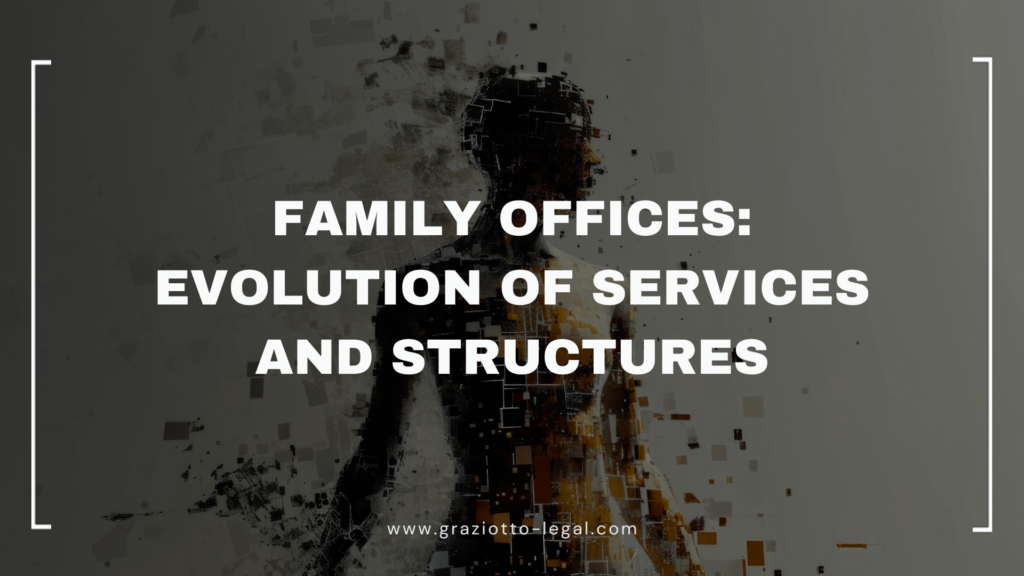

Since 2010, the Global Law Experts annual awards have been celebrating excellence, innovation and performance across the legal communities from around the world.
posted 4 days ago
The evolution of family offices has been marked not only by a shift in clientele and geography but also by a substantial transformation in the range and complexity of services offered.
As family offices have grown in number and diversity, so too have the services and structure evolved to meet the changing needs and aspirations of affluent families.
– Traditional Investments: Initially, family offices primarily managed traditional investments such as stocks, bonds, and real estate. The focus was on preserving wealth and providing stable income.
– Alternative Investments: Over time, family offices started diversifying into alternative investments, including hedge funds, private equity, and venture capital. This shift allowed families to achieve higher returns and diversify risks.
– Direct Investments: Recently, many family offices have also started to engage in direct investments, taking an active role in the companies they invest in. This approach aligns with the desire of some families to have more control and influence over their investments.
– Estate Planning: Family offices began to offer comprehensive estate planning, ensuring smooth transitions and minimizing tax liabilities.
– Tax Planning and Compliance: Managing complex tax structures across different jurisdictions became a critical service, reflecting the globalized nature of modern wealth.
– Insurance and Risk Management: Family offices expanded their services to include insurance and risk management, providing a holistic approach to financial planning.
– Strategic Giving: Family offices started to develop strategic giving plans, aligning philanthropy with family values and long-term goals.
– Impact Investing: A growing focus on social responsibility led family offices to explore impact investing, aiming to achieve both financial returns and positive societal impacts.
– Succession Planning: The complexity of modern family structures necessitated sophisticated succession planning, considering both business and personal aspects.
– Family Education: Family offices began to offer education and mentoring programs, preparing the next generation for responsible wealth stewardship.
– Cross-Border Services: With families increasingly operating across borders, family offices needed to understand and navigate different legal and regulatory environments.
– Multi-Jurisdictional Structures: Creating and managing complex legal structures across multiple jurisdictions became a core service for family offices serving international families.
– Digital Tools and Platforms: The integration of technology enabled family offices to offer more personalized and efficient services.
– Data Security: With increased digitalization came a focus on data security, ensuring the confidentiality and integrity of sensitive family information.
– Shared Services: The multi-family office model allowed families to share resources and access a broader range of expertise.
– Tailored Offerings: Despite serving multiple families, MFOs managed to provide tailored services, maintaining the personalized touch that has been a hallmark of family office management.
– Compliance Management: Navigating the ever-changing regulatory landscape became an essential aspect of family office management, requiring continuous monitoring and adaptation.
– Health and Wellness Services: The recent trend in some family offices is to include wellness and lifestyle management, reflecting a more holistic approach to family well-being.
– Proactive Planning: Family offices started to play a vital role in crisis management, providing families with strategies and support during unforeseen events and emergencies.
The services and structures within family offices have evolved in response to the diverse and multifaceted needs of modern affluent families.
The transformation from traditional investment management to a comprehensive suite of services reflects the complexity of modern wealth and the unique challenges and opportunities that come with it.
From investment strategies and financial planning to philanthropy and family governance, family offices have become a one-stop solution for wealthy families, offering an integrated approach that aligns with their values, goals, and global lifestyles.
For more in-depth information you can consult my latest book «The Global Manual for Family Offices», Volume 1, Chapter 4.1.2, Pg. 241.
Author


No results available
Resetposted 1 day ago
posted 1 day ago
posted 2 days ago
posted 4 days ago
posted 4 days ago
No results available
ResetSign up for the latest advisory briefings and news within Global Advisory Experts’ community, as well as a whole host of features, editorial and conference updates direct to your email inbox.
Naturally you can unsubscribe at any time.
Global Advisory Experts is dedicated to providing exceptional advisory services to clients around the world. With a vast network of highly skilled and experienced advisers, we are committed to delivering innovative and tailored solutions to meet the diverse needs of our clients in various jurisdictions.